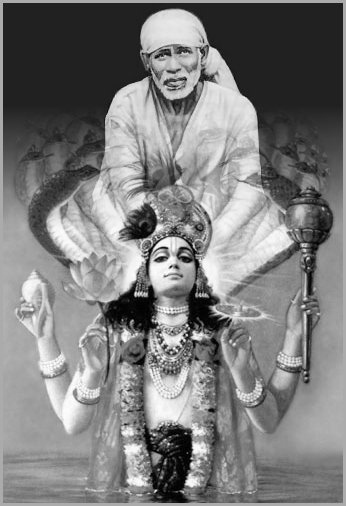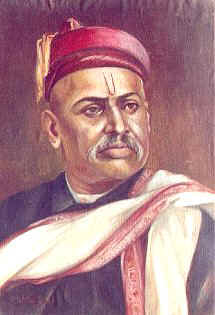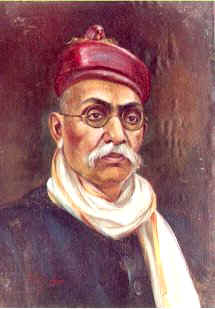 SABURI
SABURI
 SABURI
SABURI
Yug Yug Key Avathaara Sai Rama Sai Krishna Sai Baba Baba Sai Baba Baba Sai Baba Yug Yug Key Avathaara Sai Rama Sai Krishna Sai Baba Allah Yesu Nanak Sai Buddha Zorashtra Mahaveera Sai Ram Rahim Jai Ram Rahim Jai Ram Rahim Jai Sai(Hey Sai Baba, You are the incarnation of the Age. You are Rama, You are Krishna. You are Allah, You are Jesus and Guru Nanak. You are also Buddha, Zoraster and Mahaveer. Victory to Ram, victory to Rahim)

|
SHRI SAI SATHCHARITHA

|

|
|
|
Chapter 39 |
|
Baba's Knowledge of Sanskrit
His Interpretation of a Verse from Gita - Construction of the Samadhi Mandir.
This chapter (39) deals with Baba's interpretation of a verse from the Bhagawad-Gita. As some people believed that Baba knew not Sanskrit, and the interpretation was Nanasaheb Chandorkar's, Hemadpant wrote another chapter (50) refuting that objection. As the chapter No.50 deals with the same subject-matter, it is incorporated in this chapter.
Preliminary
Blessed is Shirdi and blessed is Dwarkamayi where Shri Sai lived and moved until He took Mahasamadhi. Blessed are the people of Shirdi whom He obliged and for whom He came such long distance. Shirdi was a small village first, but it attained great importance, on account of His contact and became a Tirtha, holy place of pilgrimage. Equally blessed are the womenfolk of Shirdi, blessed is their whole and undivided faith in Him. They sang the glories of Baba while bathing, grinding, pounding corn and doing other house-hold work. Blessed is their love, for they sang sweet songs which calm and pacify the minds of the singers and listeners.
Baba's Interpretation
Nobody believed that Baba knew Sanskrit. One day He surprised all by giving a good interpretation of a verse from the Gita to Nanasaheb Chandorkar. A brief account about this matter was written by Mr.B.V.Deo, Retired Mamlatdar and published in Marathi in 'Shri Sai Leela' magazine, Vol IV. Sphuta Vishaya, page 563. Short accounts of the same are also published in 'Sai Baba's Charters and Sayings' page 61 and in 'The Wondrous Saint Sai Baba', page 36 - both by Brother B.V.Narsimhaswami. Mr.B.V.Deo has also given an English version of this in his statement dated 27-9-1936 and published on page 66 of "Devotees' Experiences, Part III" published by the said Swami. As Mr.Deo has got first hand information about this Subject from Nanasaheb himself we give below his version.
Nanasaheb Chandorkar was a good student of Vedanta. He had read Gita with commentaries and prided himself on his knowledge of all that. He fancied that Baba knew nothing of all this or of Sanskrit. So, Baba one day pricked the bubble. These were the days before crowds flocked to Baba, when Baba had solitary talks at the Mosque with such devotees. Nana was sitting near Baba and massaging His Legs and muttering something.
Baba - Nana, what are you mumbling yourself?
Nana - Iam reciting a shloka (verse) from Sanskrit.
Baba - What shloka?
Nana - From Bhagawad-Gita
Baba - Utter it loudly.
Nana then recited B.G.IV-34 which is as follows :-
'Tadviddhi Pranipatena Pariprashnena Sevaya,
Upadekshyanti Te Jnanam Jnaninastattwadarshinah'
Baba - Nana, do you understand it?
Nana - Yes.
Baba - If you do, then tell me.
Nana - It means this - "Making Sashtanga Namaskar, i.e., prostration, questioning the guru, serving him, learn what this Jnana is. Then, those Jnanis that have attained the real knowledge of the Sad-Vastu (Brahma) will give you upadesha (instruction) of Jnana."
Baba - Nana, I do not want this sort of collected purport of the whole stanza. Give me each word, its grammatical force and meaning.
Then Nana explained it word by word.
Baba - Nana, is it enough to make prostration merely ?
Nana - I do not know any other meaning for the word 'pranipata' than 'making prostration'.
Baba - What is 'pariprashna'?
Nana - Asking questions.
baba - What does 'Prashna' mean?
Nana - The same (questioning).
Baba - If 'pariprashna' means the same as prashna (question), why did Vyasa add the prefix 'pari'? Was Vyasa off his head?
Nana - I do not know of any other meaning for the word 'pariprashna'.
Baba - 'Seva', what sort of 'seva' is meant?
Nana - Just what we are doing always
Baba - Is it enough to render such service?
Nana - I do not know what more is signified by the word 'seva'.
Baba - In the next line "upadekshyanti te jnanam", can you so read it as to read any other word in lieu of Jnanam?
Nana - Yes.
Baba - What word?
Nana - Ajnanam.
Baba - Taking that word (instead of Jnana) is any meaning made out of the verse?
Nana - No, Shankara Bhashya gives no such construction.
Baba - Never mind if it does not. Is there any objection to using the word "Ajnana" if it gives a better sense?
Nana - I do not understand how to construe by placing "Ajnana" in it.
Baba - Why does Krishna refer Arjuna to Jnanis or Tattwadarshis to do his prostration, interrogation and service? Was not Krishna a Tattwadarshi, in fact Jnana himself.
Nana - Yes He was. But I do not make out why he referred Arjuna to Jnanis?
Baba - Have you not understood this?
Nana was humiliated. His pride was knocked on the head. Then Baba began to explain -
(1) It is not enough merely to prostrate before the Jnanis. We must make Sarvaswa Sharangati (complete surrender) to the Sad-guru.
(2) Mere questioning is not enough. The question must not be made with any improper motive or attitude or to trap the Guru and catch at mistakes in the answer, or out of idle curiosity. It must be serious and with a view to achieve moksha or spiritual progress.
(3) Seva is not rendering service, retaining still the feeling that one is free to offer or refuse service. One must feel that he is not the master of the body, that the body is Guru's and exists merely to render service to him.
If this is done, the Sad-guru will show you what the Janna referred to in the previous stanza is.
Nana did not understand what is meant by saying that a guru teaches ajnana.
Baba - How is Jnana Upadesh, i.e., imparting of realization to be effected? Destroying ignorance is Jnana. (cf. Verse-Ovi-1396 of Jnaneshwari commenting on Gita 18-66 says - "removal of ignorance is like this, Oh Arjuna, If dream and sleep disappear, you are yourself. It is like that." Also Ovi 83 on Gita V-16 says - "Is there anything different or independent in Jnana besides the destruction of ignornace?")* Expelling darkness means light. Destroying duality (dwaita) means non-duality (adwaita). Whenever we speak of destroying Dwaita, we speak of Adwaita. Whenever we talk of destroying darkness, we talk of light. If we have to realise the Adwaita state, the feeling of Dwaita in ourselves has to be removed. That is the realization of the Adwaita state. Who can speak of Adwaita while remaining in Dwaita? If one did, unless one gets into that state, how can one know it and realise it?
Again, the Shishya (disciple) like the Sad-guru is really embodiment of Jnana. The difference between the two lies in the attitude, high realization, marvellous super-human Sattva (beingness) and unrivalled capacity and Aishwarya Yoga (divine powers). The Sad-guru is Nirguna, Sat-Chit-Ananda. He has indeed taken human form to elevate mankind and raise the world. But his real Nirguna nature is not destroyed thereby, even a bit. His beingness (or reality), divine power and widsom remain undiminished. The disciple also is in fact of the same swarupa. But, it is overlaid by the effect of the samaskaras of innumerable births in the shape of ignorance, which hides from his view that he is Shuddha Chaitanya (see B.G. Ch. V-15). As stated therein, he gets the impressions - "Iam Jiva, a creature, humble and poor." The Guru has to root out these offshoots of ignorance and has to give upadesh or instruction. To the disciple, held spell-bound for endless generations by the ideas of his being a creature, humble and poor, the Guru imparts in hundreds of births the teaching - "You are God, you are mighty and opulent." Then, he realizes a bit that he is God really. The perpetual delusion under which the disciple is labouring, that he is the body, that he is a creature (jiva) or ego, that God (Paramatma) and the world are different from him, is an error inherited from innumerable past births. From actions based on it, he has derived his joy, sorrows and mixtures of both. To remove this delusion, this error, this root ignorance, he must start the inquiry. How did the ignorance arise? Where is it? And to show him this is called the Guru's upadesh. The following are the instances of Ajnana :-
1 - I am a Jiva (creature)
2 - Body is the soul (I am the body).
3 - God, world and Jiva are different.
4 - I am not God.
5 - Not knowing, that body is not the soul.
6 - Not knowing that God, world and Jiva are one.
Unless these errors are exposed to his view, the disciple cannot learn what is God, jiva, world, body; how they are inter-related and whether they are different from each other, or are one and the same. To teach him these and destroy his ignorance is this instruction in Jnana or Ajnana. Why should Jnana be imparted to the jiva, (who is) a Jnanamurti? Upadesh is merely to show him his error and destroy his ignorance.
Baba added :- (1) Pranipata implies surrender. (2) Surrender must be of body, mind and wealth; Re: (3) Why should Krishna refer Arjuna to other Jnanis? "Sadbhakta takes every thing to be Vasudev (B.G.VII-19 i.e., any Guru will be Krishna to the devotee) and Guru takes disciple to be Vasudev and Krishna treats both as his Prana and Atma (B.G.7-18, commentary of Jnanadev on this). As Shri Krishna knows that there are such Bhaktas and Gurus, He refers Arjuna to them so that their greatness may increase and be known.